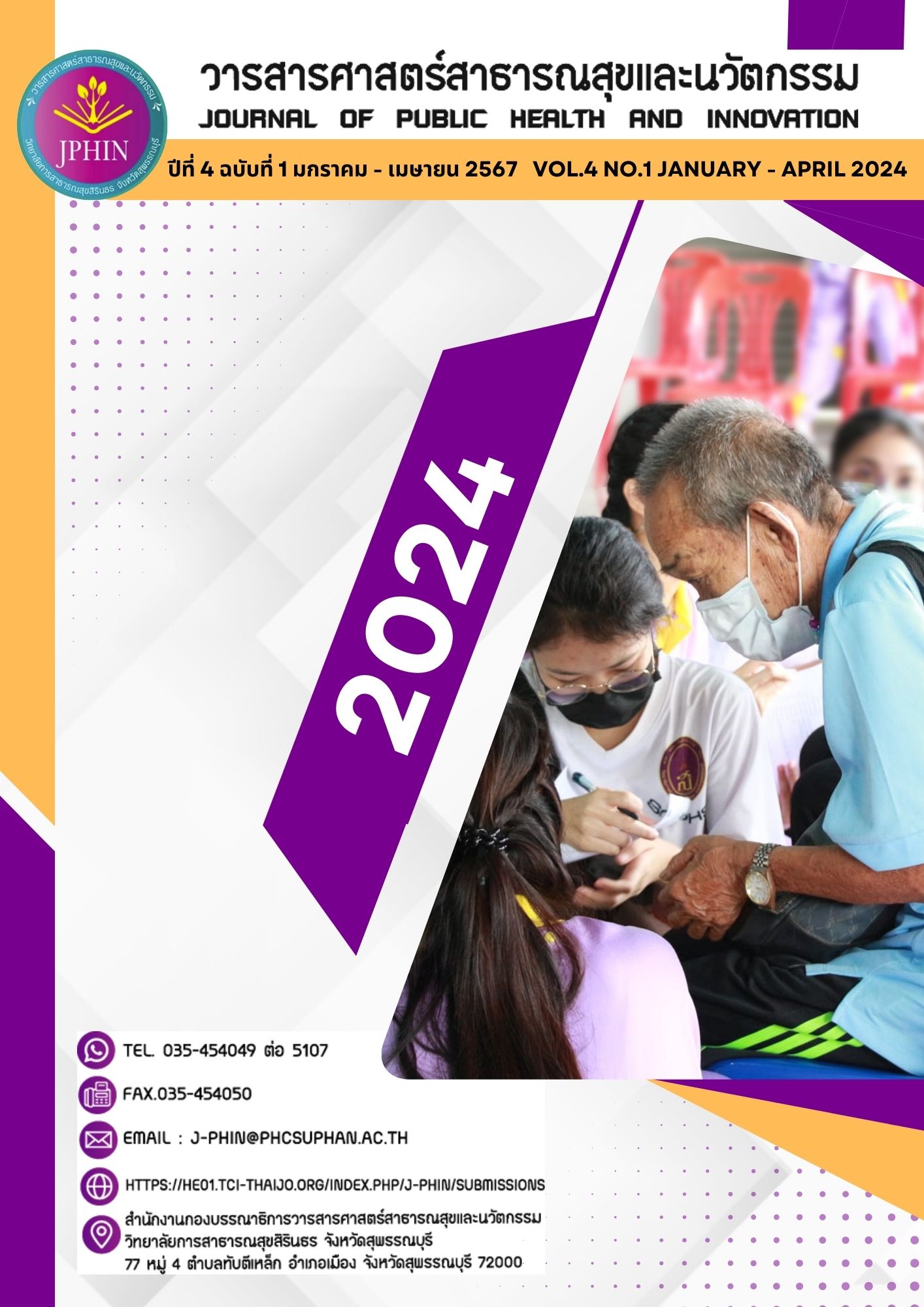การจัดการเรียนการสอนด้วยหัวใจความเป็นมนุษย์
Keywords:
การจัดการเรียนการสอน, ชุดกิจกรรม, หัวใจความเป็นมนุษย์, เทคนิคการสะท้อนการวิเคราะห์Abstract
This mixed method of quantitative and qualitative research was aimed to study effect of activities package on humanized care educational to humanized care behavior and teaching. The population consisted of 40 pharmacy technique students in the first year of moral and professional ethics of higher vocational certificate program. The purposive sampling was used for focus group consisted of 12 Information-rich cases. Descriptive statistics were used to analyze data in part of personal data and Pair t-test was used as inferential statistics. Thereafter, the data analyses included a reflexive thematic analysis.
The finding showed that average age of samples in this study was 18.93 years old. There were females more than male in the sample group. After joining the program, their average scores in service mind (5.40±1.91), analytical thinking (4.45±2.81) and participation (2.75±1.56) were significantly higher at .05. After focus group, teaching should be group and participation learning, learning contract before class, reflection after activities and teacher: smiling, polite speaking, willing to practice, empathy, trust, deep listening and make be class like comfort zone.
The suggestion of this research is other researchers should create and adapt activities to develop teacher, monitor and evaluate students and teachers.
References
จรีรัตน์ อินทวัฒน์, ธนพล บรรดาศักดิ์ และ นฤมล จันทรเกษม. (2560). กระบวนทัศน์ในการดูแลด้วยหัวใจความเป็นมนุษย์: บทเรียนจากค่ายศิลานธรรม. สันติศึกษาปริทรรศน์ มจร., 5(2), 376-387.
จิตติรัตน์ แสงเลิศอุทัย และชัยยุธ มณีรัตน์. (2562). การวิจัยปฏิบัติการในชั้นเรียนเพื่อพัฒนาการเรียนการสอน. วิจัยและพัฒนาหลักสูตร. 9(2), 1-11.
บุษกร โกมลภมร. (2557). นวัตกรรมการเรียนรู้ที่ตอบสนองรูปแบบการจัดการศึกษาแบบบูรณาการเพื่อพัฒนาการคิดอย่างเป็นระบบ และจิตบริการด้วยหัวใจความเป็นมนุษย์ภายใต้สังคมพหุวัฒนธรรม. เครือข่ายวิทยาลัยพยาบาลและการสาธารณสุขภาคใต้, 1(3), 88-92.
บุษกร เชี่ยวจินดากานต์. (2561). เทคนิคการวิจัยเชิงคุณภาพแบบกรณีศึกษา. ศิลปศาสตร์ปริทัศน์, 13(25):103-118.)
พระพันธวัฒน์ ธมฺมวฑฺฒโน (ภูมิรัง) และ วิทยา ทองดีพระพันธวัฒน์. (2565). การจัดการเรียนรู้แบบใช้ปัญหาเป็นฐาน. มจร อุบลปริทรรศน์, 7(1), 967-976.
พระราชบัญญัติการศึกษาแห่งชาติ พ.ศ.2562 (2562, 1 พฤษภาคม). ราชกิจจานุเบกษา ฉบับกฤษฎีกา. เล่ม 136 (ตอนที่ 57 ก).
วรวิทย์ ชัยพรเจริญศรี, บุญสืบ โสโสม และกนกอร ชาวเวียง. (2560). การทบทวนความรู้งานวิจัยด้านการจัดการเรียนการสอนที่พัฒนาคุณลักษณะหัวใจความเป็นมนุษย์: กรณีศึกษาวิทยาลัยพยาบาลบรมราชชนนี พระพุทธบาท. พยาบาลสาธารณสุข, 31(1), 146-159.
วราพร วันไชยธนวงค์, วราภรณ์ ยศทวี และจุฬาวรี ชัยวงค์นาคพันธ์. (2560). การพัฒนาความตระหนักในคุณค่าของชีวิตสำหรับนักศึกษา. วิทยาลัยพยาบาลบรมราชชนี อุตรดิตถ์, 9(2), 112-127.
สถาบันพระบรมราชชนก. (2553). การพยาบาลบุคคลที่มีปัญหาสุขภาพ ในต้นแบบการสอนบูรณาการ ชุดวิชาการพยาบาล. นนทบุรี: สถาบันพระบรมราชชนก กระทรวงสาธารณสุข.
สถาบันพระบรมราชชนก. (2561). แผนยุทธศาสตร์สถาบันพระบรมราชชนก พ.ศ.2560-2564. สถาบันพระบรมราชชนก สำนักงานปลัดกระทรวง กระทรวงสาธารณสุข.
สุภางค์ จันทวานิช. (2559). วิธีการวิจัยเชิงคุณภาพ. พิมพ์ครั้งที่ 23. กรุงเทพฯ: สำนักพิมพ์แห่งจุฬาลงกรณ์มหาวิทยาลัย.
สุภาภรณ์ อุดมลักษณ์, พิมพิมล วงศ์ไชยา, สิริสุดา เตชะวิเศษ และสมศรี สัจจะสกุลรัตน์. (2558). อัตลักษณ์บริการสุขภาพด้วยหัวใจความเป็นมนุษย์ของบัณฑิต วิทยาลัยพยาบาลบรมราชชนนี พะเยา. พยาบาลกระทรวงสาธารณสุข, 25(3), 14-26.
อัญญา ปลดเปลื้อง, อัจฉรา มีนาสันติรักษ์, ดวงใจ เปลี่ยนบำรุง, ชุติมา รักษ์บางแหลม และศรีเสาวลักษณ์ อุนพรมมี. (2561). ประสบการณ์การเรียนรู้การดูแลแบบให้คุณค่าความเป็นมนุษย์. มหาจุฬานาครทรรศน์, 5(3), 745-770.
Aloni, N. (2013). Empowering dialogues in humanistic education. Educational Philosophy and Theory. Institute of Education Sciences, 10(45), 1067-1081. Retrieved from http://dx.doi.org/10.1111/j.1469-5812.2011.00789.x.
Bohm, D. (1996). On dialogue. London: Routledge Classics.
Braun V, & Clarke V. (2019). Reflecting on reflexive thematic analysis. Qualitative Research in Sport, Exercise and Health, 11(4), 589-597.
Kleiman, S. (2007). Revitalizing the humanistic imperative in nursing education. Nursing Education Perspective, 28(4), 209-213.
Motta Mda G. (2004). Humanized Care in the Teaching of Nursing. Revista Brasileira de Enfermagem, 57(6), 758-760.
Wynd, C. A., Schmidt, B., & Schaefer, M. A. (2003). Two Quantitative Approaches for Estimating. Western Journal of Nursing Research, 25(5), 508-518. Retrieved from http://wjn.sagepub.com/content/25/5/508.
Downloads
Published
How to Cite
Issue
Section
License
Copyright (c) 2024 Sirindhorn College of Public Health, Suphanburi

This work is licensed under a Creative Commons Attribution-NonCommercial-NoDerivatives 4.0 International License.
1. บทความหรือข้อคิดเห็นใด ๆ ที่ปรากฏในวารสารศาสตร์สาธารณสุขและนวัตกรรม ที่เป็นวรรณกรรมของผู้เขียน บรรณาธิการ ไม่จำเป็นต้องเห็นด้วย
2. บทความที่ได้รับการตีพิมพ์ถือเป็นลิขสิทธิ์ของ วารสารศาสตร์สาธารณสุขและนวัตกรรม






